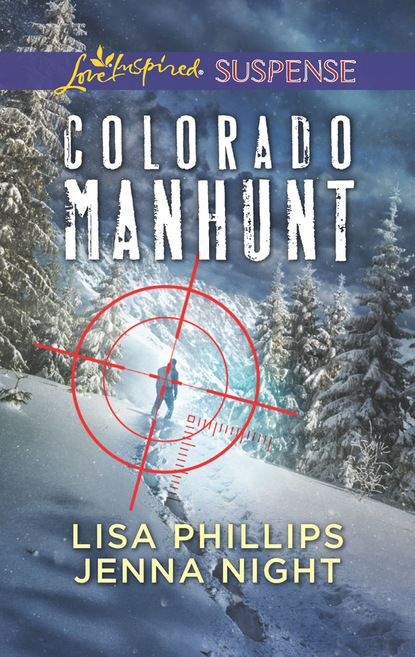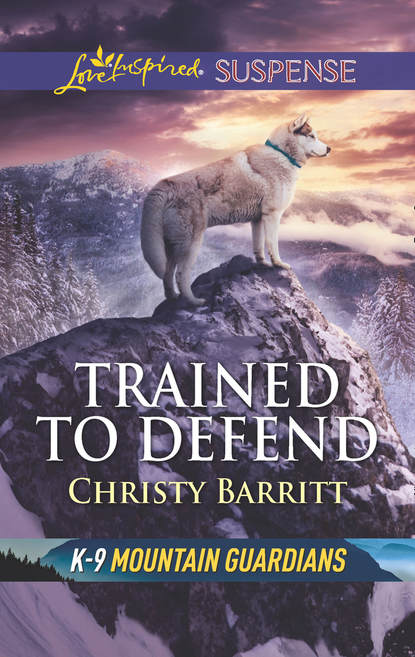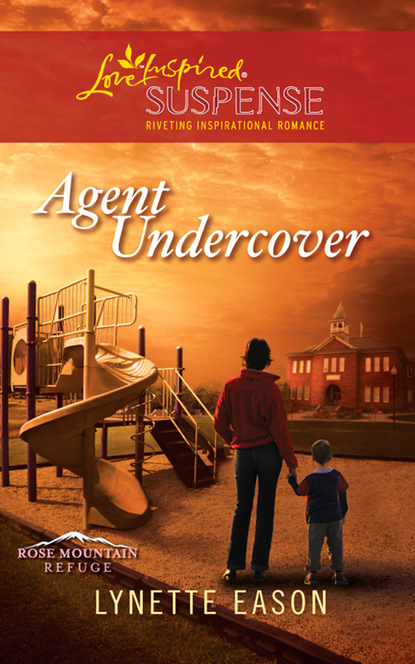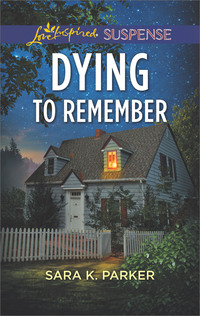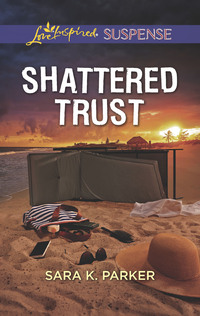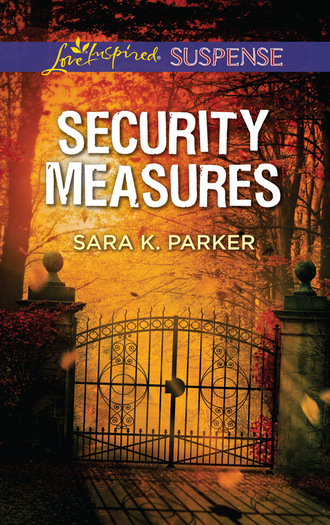
Полная версия
Security Measures
“Yes. The service was short and sweet.” She stared out the rear window, then finally looked at Hunter. “So, you followed me out?”
He read the question in her gaze, but didn’t think she’d appreciate that he’d seen her crying and had worried about her. “Thought I’d catch you at Harmony, see how you were doing.” That was the truth, minus a few details.
“It’s a good thing you followed me.” Tears brimmed under her eyes, her voice thick. “Five more seconds and...”
She would have been dead. No way around it. They both knew it.
A fire truck swerved onto the shoulder, firefighters rushing toward her car with retardant, the sirens cutting off. Triss watched silently, emotionless. He couldn’t figure her out. Every time she let him see a piece of her heart, she quickly hid behind a mask of indifference. It was that habit that had finally convinced him to let her keep the distance she was forever trying to expand between them. His kids had been confused and hurt when she’d disappeared from their lives months ago, and Hunter wouldn’t put them through that disappointment again.
He was glad he’d come today, glad he’d been there at the right time. But it was time to get going. He figured he should call Luke in to take over.
A police officer approached the truck, and Hunter opened the door, stepping out. He immediately recognized the officer as a friend of Roman’s they’d worked with in the past.
“Officer Goodson,” Hunter said, offering a hand to the seasoned cop, noting his impeccable uniform and alert expression.
“Hunter.” They shook hands, and Hunter motioned to Triss inside the cab.
“The Mustang is hers.”
“Was,” she muttered, leaning her head toward them to greet the officer.
“Doesn’t look like you should have made it out of that alive,” the officer commented. “Are you injured?”
“Not that I can tell.”
“We’ve got paramedics on the scene. I’d encourage you to take a ride and get checked out at the hospital, anyway, after we speak.”
“I’ll see my doctor tomorrow if I need to,” she said. “But I appreciate it.”
“You should let them check you out at the hospital,” Hunter suggested. “It was a pretty bad wreck.”
She shook her head. “I’m fine.”
“You could have internal—”
“Hunter.”
She’d made her decision, and there was nothing he could say to change her mind. Her jaw was set, her lips pressed together. He knew the look when he saw it.
The officer ducked his head slightly so he could see her. “Tell me what happened.”
Hunter listened with interest as she described hearing a distinct pop before she smelled smoke. He hadn’t seen anything but the smoke, and he wondered what could have caused the pop. The interview was brief, and the officer handed her his card. Once again, he advised her to get checked out and to rest up, and then he returned to the scene.
“That was a sweet ride,” Hunter said. “Looks like there’s no saving it.”
“No. But I’ll have it towed to my mechanic, anyway. Hopefully, he can figure out what happened. I can’t afford not to get anything from insurance.”
The moments before the wreck played through Hunter’s mind, the sudden smoke billowing at the rear of the car. “Wonder what could have caused that fire.”
She was quiet for a moment too long, and then she shifted in her seat, pulling off his jacket and handing it to him before raising her seat straight. She was clearly ignoring his comment. “Would you mind driving me to Harmony after I get the car situation settled?”
“Hold on a minute,” he said, searching her eyes for what he was missing.
She held his gaze, her expression unreadable. “What?”
“You’re not telling me something.”
She glanced away for a fraction of a second, and he knew he was right.
“What is it?” he persisted when she didn’t respond.
She shook her head. “Probably nothing.”
“Well, if that isn’t the most overused and usually inaccurate phrase we hear in our line of work, I don’t know what is.”
It was a phrase used too often by victims of stalking and domestic violence, unsure whether they were in danger or out of their minds.
Triss sighed. “I know. But what I’m thinking sounds crazy.” She stared into his eyes with conviction, as if willing him to believe what she was about to say.
He already did. He might still be rankled by how suddenly she’d dropped out of his life—out of his kids’ lives—but that didn’t change what he knew about her. She was intuitive, sharp and levelheaded. She was not prone to drama, exaggeration or misinterpretation. And if Triss Everett had something bizarre to say, she’d only say it if she knew it to be true.
“I can handle crazy.”
Her eyes were dark, troubled in a way he’d never seen before. “I don’t think what happened was an accident, Hunter,” she said finally. “I think someone caused the fire. I think someone hoped I would die. And I think that same person may have killed before. At Harmony.”
That, he hadn’t expected. Hunter reached for what to ask next, and Triss narrowed her eyes.
“You said you could handle crazy.” In a flash, she reached for the door. “I’m going to talk to the tow-truck driver.”
“Hey.” He slid his hand to her free arm, tugging her wrist gently to get her to stay. She looked at him, her eyes flashing annoyance. But, also, uncertainty. “I’m not going anywhere,” he said, because it seemed like that was what she needed to hear, even if he thought it couldn’t be more obvious. “But I’m going to need more details.”
She yanked her wrist from his hand, but let go of the door handle, her attention flicking to the clock on the dashboard. “There’s a lot to tell you. But I need to get to Harmony. There’s the reception, and I need to—”
“The reception can go on without you, Triss. You’ve been in a major accident. I still think you should get checked out at the hospital.”
She was already shaking her head and reaching for the door again. “I’m fine. Just let me talk to the tow-truck driver, and I’ll give you more details on the drive back.”
“Sure,” he said more casually than he felt, pushing away a dark flash of memory from the night his wife had died. He should have called the ambulance sooner, or picked her up bodily and forced her to go to the hospital. His misjudgment had cost her her life. Now, he wished Triss would listen to him—but he was just a coworker and had no right to push her. Still, he wasn’t without recourse. He couldn’t force her to go to the hospital, but she couldn’t force him to go home, either. And he wouldn’t be heading home tonight until he was sure she was safe.
TWO
“Start at the beginning,” Hunter said, pulling onto the interstate.
Twenty-five minutes of highway stretched between the cemetery and Harmony Senior Living. It wasn’t enough time to explain all that had happened, but Triss never used more words than she had to, so she would make it work.
“The first person who died was Walter,” Triss started. “Walter Tompkins. He was eighty-six. Diabetic coma while he slept. He never woke up. All the residents were talking about how it was the perfect way to go. Everyone wants to die in their sleep.”
Hunter said nothing, so she continued. “Genevieve Hail was next. Her boyfriend always called her Jenna-Doll. She was sixty-seven. Heart attack during dialysis.”
“Boyfriend?”
“Don. He’s a resident, too. They’d been together about a year. He was planning to propose.”
“How long after Walter?”
“Six days.”
“Go on.”
“Connie Mays, four days later. Walking pneumonia got serious fast. She died while reading in her armchair. She was the healthiest seventy-two-year-old I’d ever met. And then, she was dead.”
“And this time, Frank Townsend,” Hunter said. “What was his story?”
“Ten days had passed. I’d started to think that the three deaths had been a tragic fluke. A bad season at Harmony. But Frank—he overdosed on prescription painkillers. He was one of the newer residents, always cheerful. Everyone loved him.”
“People learn to hide their pain,” Hunter pointed out.
“I won’t argue with that. Another possibility is an accidental overdose. He was a bit of a drinker and he’d had a beer or two that day. His daughter also mentioned she thought he’d started to show signs of dementia. He was scheduled for an evaluation later this week.”
Hunter nodded. “My mom suffered with dementia. Caught her consuming a whole stick of butter one day. She’d ingest anything that wasn’t locked up.”
“Exactly,” Triss agreed. “Which is why I know this sounds crazy. There’s a logical explanation for all of these deaths. But something doesn’t sit right with me. That’s a lot of death in a short amount of time.”
“At a residential community for the elderly,” Hunter added. He glanced over at her. “But?”
“But my gut tells me something else is going on,” Triss responded.
She filled him in on the lax security at Harmony and her ideas for tightening it up—if for nothing else, then for her own peace of mind. She told him about the meeting she’d held two days ago to get the other grad students and some staff on board—and how no one seemed to take her concerns seriously. And she told him that she’d started to wonder if she simply was being paranoid and not dealing well with grief.
Hunter was mostly quiet as she told the story, but that was his way. She’d been with him on enough interviews to know how he operated. When drawing up security plans, he believed in long silences and letting clients tell their stories until they ran out of words. That’s when he would start asking questions. She let silence fall over the car and waited.
Finally, Hunter glanced over at her. “This is a lot to handle alone,” he said. “I would have backed you up at that meeting.”
“We haven’t exactly seen much of each other lately.”
A beat passed, and she immediately regretted her words. It was no one’s fault but her own that they hadn’t seen much of each other. She had a phone. She had his number. She’d purposely stayed away.
“No,” Hunter said. “We haven’t.”
She suspected he wanted to say more on that topic, but he didn’t. Their exit was coming up, and he slowed, pulling off the highway. “So, four people have died in three weeks. On Monday, you held a security meeting and no one supported your ideas, and today your car catches on fire leaving the funeral.”
“I told you it sounded crazy.” She refused to look at him, afraid to see the doubt in his eyes. She could handle that look from almost anyone. But not from Hunter.
“It does sound crazy,” he finally said, and her heart sank.
When did she get so soft? When had words gained the power to hurt her again? Why did she care if Hunter believed her? It wasn’t as if—
“But I believe you,” Hunter added.
Relief flooded over Triss. The truck turned onto the winding road that led to the senior living community, fall leaves swirling along the path. She wanted to thank him. And hug him. Strangely, she also wanted to cry. She didn’t do any of those things. Instead, as he pulled up to the security gate, she said, “Good. Now is when you help me figure out what to do next.”
She gave him the code to open the wrought-iron gate, and as he drove through it and onto the property, he glanced her way. “The next order of business would be to file a report with the police. You may not have had much to go on with the residents’ deaths, but what happened today definitely gives your concerns more credibility.”
“Right.”
“And upgrading security measures like you mentioned would be a reasonable next step.”
The narrow road opened onto the well-manicured property, tufts of golden leaves scattered along the drive and the walkways.
“I’ll get in touch with Roman tonight and see what we can pull together. They have a security team here?”
He pulled into a parking spot.
“Sort of. Two officers patrol on twelve-hour shifts. You can usually find one of them in the admin offices over there.” She pointed to a small whitewashed brick cottage across the parking lot.
“Good. I’ll try to get with one of them before I leave.” He turned off the truck and focused his attention on her. Triss forced herself to meet his gaze, to pretend that the warm concern in his soft brown eyes didn’t affect her one bit.
“You sure you’re okay? We can turn around now and get you checked out.”
“I’m fine,” she insisted, and she meant it. She hadn’t hit her head, and she wasn’t the least bit tired. She was overwhelmed. She’d almost died, and then Hunter had shown up—the man who had spent the past couple of years slowly chipping away at every wall Triss had built around her heart. The very man she’d been successfully avoiding since August.
She started to open the door, but Hunter reached past her and opened the glove box.
“Hold on.” He pulled out a packet of wet wipes and handed them to her. “Unless you want to answer a bunch of questions, you’ll want to get rid of the evidence.” A hint of a smile played on his lips, and Triss flipped down the visor mirror.
Traces of smoke residue were smudged along the side of her nose and the edge of her jaw. She took a wipe and swiped it over her skin, erasing any signs of the accident. Then she grabbed a new one for her hands, a warm thankfulness rising at Hunter’s thoughtfulness.
She handed the pack to him. “Better?”
His gaze traveled over her face, his eyes too soft. He nodded and popped the packet back in the compartment, which was also stuffed with a pack of crackers, two Pull-Ups and a box of Disney-character Band-Aids.
He glanced up at her as he closed the console, humor in his expression as he caught her observing.
“It’s my emergency stash,” he said.
Somehow, the stash made her heart ache, but Triss forced a small smile. “Always prepared.”
Of course, he would be as a single dad of two young kids.
She opened the door and stepped out, pushing away the emotions threatening to rise again. What was wrong with her?
Death. Funerals. Families weeping over graves.
And Hunter, crouching on the hood of her car, locking eyes with her and renewing her strength as her breath started to fail, just as her body started to give up.
If she was the type of woman who dreamed of happily-ever-afters, he was the type of man she would dream about. Courageous, quick and smart at work. Tender and lighthearted with his kids. Kind to everyone he met.
Of course, Triss wasn’t prone to dreaming. Even if she was, Hunter was off-limits, and she would never tell him why. The reminder wrenched at her heart as Hunter came around the front of the truck and walked alongside her. Sure, she’d moved here to cut her expenses and get out of her brother’s house. But the move had also allowed her to cut her hours at Shield and switch to the weekend night shift, which meant she rarely saw Hunter. And that had been on purpose.
“My mom lived here when her dementia got bad.”
Triss glanced over at Hunter as they headed up the walkway toward Creekside Manor, the independent-living home where Triss resided. Harmony was set on fifty wooded acres with walking trails, gardens, a man-made lake and a fitness center, and offered fresh, organic meals and live music twice a week. There were three separate homes for residents. Creekside was for those who could still live independently, and the residents resided in either single-or double-bed apartments. Silverwood Villa housed assisted-living and memory-care residents. Emerald Estate was the last stop, so to speak, with skilled nursing care available 24/7.
“This is the place to be when you can’t live on your own anymore,” Triss commented.
Hunter agreed. “Mom seemed to enjoy it. She started in Silverwood until she moved into Emerald.”
His voice had lowered, his gaze roaming over the property as they walked. “How many of the deaths were at Creekside?” he asked.
“All of them.”
He raised his eyebrows.
“Exactly.” The deaths might not have been as worrisome or noticeable if they’d happened between the three homes, or mostly in Silverwood and Emerald, but all the residents had died at Creekside—where no one required nursing care. In fact, there had only been one other death since Triss had moved in, and it was over at Emerald in September.
A car parked nearby, a young family climbing out, likely coming to visit parents and grandparents, and Triss figured she and Hunter probably shouldn’t discuss murder suspicions out in the open.
“How long did your mom live here?” she asked, moving into more neutral territory.
“Four years. She passed away when Josie was two.”
“Young for dementia, right?”
He nodded. “Sixty-three at onset. She was never the same after my dad died. He was twelve years older, a smoker. Died of lung cancer.”
Triss knew loss. She also knew that Hunter had been an only child, and she could read the latent grief in his eyes. She was scrambling to think of something to say other than “I’m sorry,” but the doors flew open in front of them and Kaye Lawson emerged, her bright red lipstick matching her wide smile and fiery hair. Kaye had moved into Harmony after a stroke, determined not to burden any of her six children, and despite her nearly full recovery, she’d stayed.
“There you are!” Kaye was a thin woman, but tall, and she wrapped Triss in a motherly hug. Triss had finally stopped avoiding Kaye’s hugs several weeks ago. She couldn’t remember what it felt like to be hugged by her own mother, an addict who had been in and out of jail for decades, bringing home questionable men and leaving for days at a time. Kaye claimed that Triss needed more hugs, and Triss was starting to think she may be right.
“Sorry I’m late,” Triss offered, not mentioning the accident. She didn’t want to draw the attention away from the celebration of Frank’s life and onto her.
“We were starting to worry about you.” The woman’s observant gaze seemed to inspect Triss with a question, but she didn’t ask it. Instead, she glanced curiously toward Hunter. “Now, who is this handsome young man?”
Hunter flashed his disarmingly charming and dimpled smile at Kaye. “Hunter Knox.” He held out a hand, but Kaye laughed.
“I only accept hugs.”
Hunter laughed, too, hugging her in greeting and sending a good-natured wink at Triss. She felt a smile tugging, her pulse suddenly racing. She looked away. This was exactly why she was trying to get some distance from him. All her defenses were useless when he was nearby.
“Hunter and I work together at Shield,” Triss said as they all walked inside. “Hunter, this is my friend Kaye.”
“Are you helping set up?” Kaye asked him.
“He doesn’t have much time,” Triss answered for him, helping him off the hook. “You have to get home for the kids, right?”
“I have time.”
“I like you already.” Kaye smiled broadly, her face a map of lines that showed she lived a life bent toward joy and maybe adventure.
“So, you have kids,” Kaye said, leading the way through the common area. “How old are they?”
“My daughter, Josie, is about to turn six. And my son, Levi, is two.”
“Oh, and I’m sure they keep you on your toes. If your wife’s at home holding down the fort, you’d better not stay here too long,” she said with a grin.
Kaye’s gaze flicked to Triss, and Triss groaned inwardly. Knowing Kaye, she’d already searched for Hunter’s wedding band, found it missing and decided she’d found Triss a husband.
“Their very young and energetic nanny is home with them, and she’s paid very well,” he said warmly. “My wife passed away after our son was born.”
Kaye’s smile fell. “Oh, dear. How sad.” She touched his arm. “I’m sure you’re a wonderful dad.”
“Thank you.” He smiled ruefully. “Some days I do better than others.”
“That’s parenthood for you. You should bring them by some time. We love kids around here. So much energy.”
“I’ve been meaning to for a while now, actually,” he said. “We’d visit sometimes when my mother was here a few years ago.”
“Well, Brandon’s over there setting up the microphone.” She pointed to the front of the room near the fireplace, where a white-haired gentleman was crouched in front of a microphone stand, his back to the room. “He’s our activities director. You should talk to him.”
“Sounds good. I’ll catch up with you two in...?”
“The kitchen or dining hall,” Triss suggested, and then followed Kaye.
“Let’s get the waters filled on the tables,” Kaye said. “Then we’ll light the centerpiece candles.”
“Got it.”
The dining hall was quiet, and a handful of residents were starting to trickle in. Triss glanced around as she filled water glasses, her focus returning now that Hunter was out of the picture. What had happened with her car had heightened her suspicions. She shifted her gaze to each new guest that entered—residents, caregivers, custodial staff, her fellow grad students. No one seemed to be paying her much attention. If anyone knew she’d been in a life-threatening accident, they weren’t letting on.
Her pitcher ran out again and she headed to the kitchen, standing at the fridge to fill it with filtered water.
“How’s it going out there?”
Triss glanced over at Barb, Creekside’s live-in chef, noting that she’d exchanged her trademark blue apron with smiling cartoon bananas for a plain black one more appropriate for the occasion.
“Good. People are starting to arrive. Need any help in here?”
Barb shook her head. “I’ve got it under control. The family wanted chicken alfredo, though—sorry, there’s not much of a substitute for that.”
“I’ll stick with the salad,” Triss said. “You know I’ve told you not to worry about me.” She had a pretty serious dairy allergy that had necessitated an EpiPen more than once in her life, and Barb couldn’t stand the idea of anyone missing out on a meal.
“I made a couple of chicken-and-rice meals for you. They’re in the fridge if you get hungry later.”
For a split second, Triss wanted to set down the pitcher and hug Barb. But that would be awkward for both of them, so she just said, “Thank you,” knowing that Barb couldn’t possibly understand how touching her thoughtfulness was. More days than she could count, there had been no food in the Everett household when she was younger. Luke was forever scavenging leftovers from restaurants and grocery stores for the three siblings to split, and a well-meaning neighbor sometimes dropped groceries by. It was a wonder Triss had survived those years. She learned many years later that Luke had scoured ingredients labels on the grocery leftovers and had made friends with two local restaurant owners, who saved dairy-free extras regularly for them. They’d had one scare, when she was six, but Luke had managed to get her to a hospital. They’d left with two separate foster families, Triss with an EpiPen. It was the first time they’d been split up—Cal and Luke to one home, and Triss to another. They’d been more careful after that.
With the pitcher topped off, Triss turned from the kitchen, pushing the swinging door open with her arm as Hunter walked in.
She stopped short, water sloshing from the pitcher onto his white button-down.
“Whoa.” He grasped the pitcher, steadying it as Triss took a quick step backward.
“Sorry,” she said, water dripping along her arms, a bubble of laughter threatening at the amused expression on Hunter’s face.
He took the pitcher from her. “Here.” Reaching past her, he grabbed a hand towel and wiped the sides of the pitcher before handing it to her. The tips of his fingers grazed her hand, sending a sudden jolt of awareness straight up her arms.
So. It hadn’t been shock earlier, when he’d lifted her into his arms and every muscle in her body had gone weak, her pulse racing as her hand had clutched a small square of his shirt. It had simply been the effect Hunter had on her. What was it about him?
“You talked to Brandon?” she asked, realizing she’d stood still for a couple of seconds too long.


